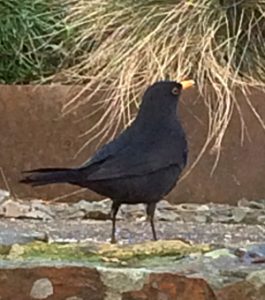Blackbirds, climate change and disease.

Climate change is introducing disease to new areas as it favours the spread of disease vectors, such as mosquitoes. Usutu is a virus disease that originated in South Africa, it is spread by mosquitos and affects birds, particularly blackbirds and owls. Whilst birds are the primary hosts to the virus, it can infect ‘incidental hosts’ such as bats and humans, through insect bites. The virus has been found in a number of mosquito species in Africa and Europe. In the U.K, and Europe the main vector is Culex pipiens - the common house mosquito or northern house mosquito. The virus has probably spread through the movement of migratory birds between Africa and Europe, and is now present in many European countries.
The virus was first detected in the London area in summer 2020 and was associated with a decline in Blackbird numbers. Blackbird numbers have declined by approximately 40% since 2018. The virus was then detected in Cambridgeshire in 2023. It seems that most Usutu infections in humans do not cause disease and so the risk to human health is considered ‘low’. There is no evidence to date that the consuming poultry poses a risk to our health. However, the detection of Usutu in the UK marks the first time that a mosquito-borne virus capable of passing from animal hosts to humans has emerged in this country. Its speed and spread are being monitored as it may model how other mosquito borne disease arrive here.
A virus that may be a particular cause for concern is the West Nile virus. This virus spreads in a similar way to Usutu and needs similar climatic conditions. West Nile virus, also transmitted through mosquito bite, can cause fever, vomiting and diarrhoea. At present, there is no vaccine available. West Nile virus was detected in the Netherlands in 2020, and there is concern that the changing climate could facilitate its spread in Europe.

Leave a comment